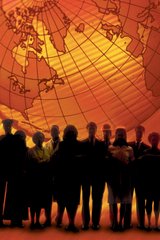 No nation exports its popular culture more than the United States. South Korea is a perfect example of this.
No nation exports its popular culture more than the United States. South Korea is a perfect example of this.All we had to do is walk down a busy street in Seoul. If it was American, or seemed American, it was ripe for cool.
We always saw people selling hats, t-shirts, shoes, and many other things. Many of these articles had something about them that was uniquely American. Sometimes it was Disney characters but that was the least interesting. The most interesting and pervasive items always contained English words and phrases on a hat or t-shirt. They were often written in large, bold text and would include a type of logo. What added the level of humor was that none, repeat, none of these words or phrases made any sense to a native English speaker. Other than random phrases of English, other items included advertisements for non-existent gas stations in the Midwest, and promotions for American sports teams that don't exist.
This display was not limited to Korean-made merchandise. Seoul was full of familiar American name brands. This is what surprised me. I have traveled to Europe on numerous occasions and American brands and retail stores were not easy to come by. Only the very largest American conglomerates such as McDonald's and Burger King had permeated the European market and even then, not quite with the success that American companies, large and not-so-large, have had in Korea.
Smoothie King, Starbucks, 7-Eleven, Dunkin' Donuts, Krispy Kreme, Cold-Stone Creamery, Baskin-Robbins, Haagen-Dazs, Bennigan's, and Outback Steakhouse. A walk down any busy street in Seoul will revealed these outlets. The busiest retail areas contained other familiar company stores such as Converse, Dickies, The North Face, and even Build-a-Bear. On any given period of the day, all of these establishments were bustling with patrons. I of course cannot forget to mention the many knock-offs sold on the streets but that is another topic for another post.
I asked a Korean friend about this and she explained this fascination with all things American. Her best explanation was that it exists. Americans have been in Korea since the 1950's and are large responsible for the founding and protection of the Republic. Koreans constantly travel to and are educated in America. Therefore, it is natural for Koreans to readily accept American "stuff" into their everyday lives.

No comments:
Post a Comment